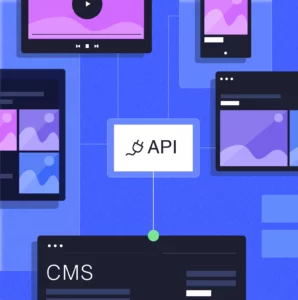When looking at content management systems (CMS), scalability refers to the ability to expand and grow your site with more content, capabilities, features, and functionality.
Your CMS is a long-term investment, and its scalability will have a strong influence on whether or not that investment is successful.
“When sustainable business growth is a top strategic objective, you need full confidence that your web presence can seamlessly scale and evolve to support that growth.”
This requires a platform that allows you to quickly and easily create new features and functionality. Ideally, you should be able to do this without having to invest significant time and resources into additional costly development work.
WordPress is One of the Most Scalable Platforms Around
Evidence of WordPress’s great scalability can be found in the fact that almost 45% of the world’s websites are built on the platform. That includes global enterprises such as investment firm Blackstone, research and advisory leader Forrester, the NHS England, and leading pharmaceutical company Hutch Med.
This is because WordPress websites can seamlessly scale as your needs change and your business grows. You can easily add a high volume of new content to your site at speed without compromising on quality.
WordPress is also renowned for how easily you, or your development partner, can build bespoke features and functionality, so your site can keep evolving with new capabilities to support more advanced requirements.
“No matter the size or complexity of your site, WordPress can provide fast, intuitive development capabilities with ongoing growth acting as a natural outcome.”
Using WordPress at Scale
Developing, managing, and maintaining a high-performance website at scale is a complex challenge. For that reason, it’s important to work with an experienced web design and development agency who can enable continual growth and support you through it.
Part of your agency’s services will include configuring your platform, and building your site in the back-end, in a way that encourages long-term scalability. We’ll explain our own approach to this in more detail in the next section. But first, let’s look at some of the fundamental ways to use WordPress at scale:
Bespoke Features and Functionality
If you want to build out your website with new capabilities, WordPress stands above all its competitors thanks to its ability to develop bespoke features that are unique to your site.
WordPress is built on PHP, which is the most popular development language around, as it’s currently used by over three quarters (77.5%) of all websites with a known server-side programming language. With PHP, WordPress has a significant advantage over other CMSs, because it allows you to create virtually anything and integrate it with the platform.
WordPress Plugins
WordPress also comes with a vast range of plugins, which can help with adding to, and enhancing, the existing functionality of your site. Plugins are an essential aspect of WordPress development, but it’s crucial that you only choose the most reputable, tested, and proven plugins.
Your agency partner should be experienced in this plugin selection and use their past experience to recommend the best ones to use for your specific requirements. Your agency partner should also be able to advise you on how plugins will scale with increases in website size or traffic volume to help preserve your site’s performance.
Using plugins that are not regularly updated, or that come from unknown development owners, could harm your site by making it heavier, slowing down your page loading times, and possibly even creating security vulnerabilities.
Using a particularly large number of plugins is another situation that could result in slower loading speeds or other performance issues. Be mindful that use of plugins can reduce the bespoke development time needed to build your site, and the use of too many plugins could cause performance issues. If you find yourself in this situation, it could be an indication that your development partner might actually be taking shortcuts.
The Importance of a Trusted Partner
Whether you’re using plugins or building new bespoke features, your agency will be able to take care of all of these crucial aspects of your development for you. Their support and guidance will ensure you can expand your site freely without running into any technical issues.
Once you have everything you need in place, your agency will then be able to accelerate the speed at which you can scale moving forward. A great agency partner will also provide you with ongoing education and support, allowing you and your team to build your site out easily and efficiently by yourself too, whenever you want or need to.
Taking a More Scalable Approach – Building with Blocks
While many agencies still use a more traditional method of developing sites with WordPress, taking a block-based approach provides even greater opportunities for dynamic scalability.
As an alternative to the time-consuming practice of inputting text and images into a rich text editor in your CMS, the block-based approach allows you to create each page on your site more easily with a set of pre-built components.
Components are blocks of code with pre-defined style and input types. You can use and re-use these components across multiple pages of your site to scale it at a much faster pace. Any time you want to create a high volume of new content, you simply pick your already-built components and place them in the correct positions.
This is an approach that enables virtually limitless growth of your website at speed with a high level of quality and accuracy. Building components that can be reused across your site will also deliver added benefits like increased efficiency and reduced costs. This in turn provides you with more time to focus on developing better services and experiences for your site visitors.
The block-based approach to building websites is another way to make your WordPress platform leaner for better performance as well, because it removes the need for a bloated library of unnecessary plugins and features.
An Enterprise-Grade CMS
Scalability should be a key aspect of your criteria when selecting a CMS to build a website. Rapid growth and flexibility are crucial for your platform of choice.
Despite some still mistakenly thinking it might not be up to the task, you can use WordPress to build large, robust, high-performance sites at speed, and easily adapt them as your requirements change.
This arguably makes WordPress one of – if not the – best CMS options available today. When you look at some of the world’s leading businesses currently using the platform to great success, that argument becomes much easier to appreciate.
Like with any CMS, though, the key to successful scalability is having the support of an experienced, trusted agency partner behind you, ensuring you’re leveraging the platform to its full potential.






